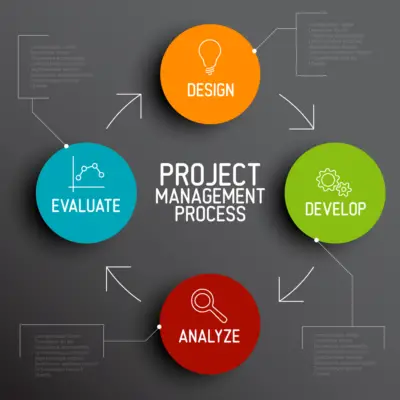The time it takes to become a project manager can vary depending on a number of factors, including your educational background, your field or industry, and your specific career path. Here’s a general guideline:
Education: First, you’d need to get a bachelor’s degree, which usually takes four years. Many project managers have management, business, or related field degrees.
Work Experience: After obtaining a bachelor’s degree, you’d typically start in an entry-level position within the industry of your choice.
Over several years (commonly 3-5), you’d gain the necessary experience to be considered for a project management role. This timeframe can greatly vary depending on the complexity of projects, the industry, and the organization.
Certification: While not always required, many project managers get certified to enhance their credibility and job prospects. The Project Management Professional (PMP) certification offered by the Project Management Institute (PMI) is one of the most recognized certifications. To apply for the PMP exam, you need either:
The time spent getting certified would depend on how quickly you complete the project management education hours and how much time you spend preparing for the exam.
Continuous Learning: Once you become a project manager, you must continually update your skills and knowledge. This can be through additional certifications, workshops, seminars, or further education such as a master’s degree or MBA.
To sum it up, it usually takes around 7-9 years to become a project manager, including the time spent on education (4 years for a bachelor’s degree), gaining relevant work experience (3-5 years), and earning certifications (if applicable).
However, this timeframe is flexible and depends on individual circumstances, career progression, and the specific requirements of the industry or company.
Becoming a project manager is an attractive career option for professionals who enjoy leading teams and managing complex projects. Project managers are responsible for planning, organizing, and executing projects within a set budget, timeframe, and scope.
To become a project manager, one must follow certain steps that involve education, training, work experience, and certification. This article will discuss the various paths to becoming a project manager and how long it may take to attain this position.

Obtain a Relevant Bachelor’s Degree
A bachelor’s degree in a relevant field, such as business administration, engineering, or information technology, can provide the foundational knowledge and skills for individuals aspiring to become project managers.
Higher education is valuable for learning practical project management techniques and provides an opportunity to develop analytical thinking and problem-solving abilities. Career options are broadened when one holds a bachelor’s degree, which increases the likelihood of landing a job in the field.
In addition to being academically prepared with hard skills, individuals who obtain a bachelor’s degree are likely to have stronger communication and leadership skills. Project managers must communicate effectively with team members and stakeholders while keeping everyone on track toward completing tasks efficiently.
The ability to lead teams through complex projects is also crucial for success. A bachelor’s degree program prepares students by allowing them to work collaboratively on group projects that mirror real-life situations.
Employers often require candidates to hold at least a bachelor’s degree before considering them for project manager positions. During this time, students can gain experience through internships or entry-level jobs in related fields that will help them develop their skill sets.
A solid academic foundation in project management paves the way for career advancement opportunities without any limits set by a lack of knowledge or qualifications.
Gain Hands-On Experience
Acquiring practical skills through active participation in various projects can bolster one’s proficiency and readiness for assuming leadership roles. In project management, hands-on experience is a necessary component to understand the complexities involved in leading a team toward achieving project goals.
Practical training can be obtained by working under the supervision of experienced project managers or volunteering for non-profit organizations.
On-the-job learning is crucial to gaining hands-on experience as it exposes individuals to real-life scenarios where they must make decisions and solve problems that arise during a project.
This type of learning also helps build confidence, communication skills and fosters adaptability in individuals looking to transition into project management roles.
Additionally, being part of multiple projects with varying scopes and industries provides exposure to different methodologies and tools used in managing projects.
Aspiring project managers can pursue certifications such as Project Management Professional (PMP) or Certified Associate in Project Management (CAPM) to enhance their knowledge further.
These certifications formally recognize an individual’s knowledge and expertise in managing projects while demonstrating their commitment to professional development.
However, it is important to note that practical experience remains critical as no amount of theoretical knowledge can replace on-the-job learning when successfully managing complex projects.
Earn a Project Management Certification
To further enhance your career as a project manager, earning a project management certification can help solidify your credentials and expertise in the field.
Choosing a certification program that aligns with your career goals and professional interests is the first step towards achieving this goal.
Once you have selected a program, studying diligently and passing the certification exam will demonstrate to potential employers your commitment to continuous learning and development in project management.
Choose a Certification Program
One option for individuals interested in becoming a project manager is to consider enrolling in a certification program. These programs offer structured courses and exams covering the essential skills and knowledge to manage projects effectively.
The most popular certification programs are offered by the Project Management Institute (PMI), including the Certified Associate in Project Management (CAPM) and Project Management Professional (PMP) certifications.
Career benefits of completing a project management certification program include increased job opportunities, higher salaries, and greater credibility with potential employers.
According to PMI’s 2020 Salary Survey, PMP-certified professionals earn an average salary of $120,000 annually, while non-certified project managers earn an average of $95,000 annually.
However, it is important to note that these programs can be costly, with fees ranging from several hundred dollars to over $1,000.
Prospective students should carefully research their options and consider factors such as program cost and time commitment before enrolling in a certification program.
Study and Pass the Certification Exam
Passing the certification exam is necessary for aspiring project managers to validate their knowledge and skills in the field. Exam preparation requires a significant time commitment, as candidates must thoroughly understand the exam content and format before sitting for it.
This involves familiarizing themselves with various project management methodologies, tools, techniques, and frameworks and understanding how these concepts apply in different contexts.
To increase their chances of success, candidates should develop a study plan that fits their schedule and learning style. They can supplement their learning with various resources such as textbooks, online courses, practice exams, and study groups.
It is also essential to take advantage of exam simulations and review sessions provided by certification providers to gain familiarity with the actual test-taking environment.
Build Your Professional Network
Establishing a strong professional network can significantly enhance the career prospects of aspiring project managers. Networking events, for example, provide an opportunity to meet other professionals in the field and learn about current trends and best practices.
At these events, participants can exchange ideas, share experiences, and gain valuable insights to help them improve their skills as project managers.
Another way to build a professional network is through LinkedIn connections. By creating a profile on this social media platform, individuals can connect with other professionals in their industry and expand their reach beyond their immediate circle of colleagues.
Through LinkedIn groups and discussions, they can also participate in conversations related to project management topics and establish themselves as thought leaders within the community.
Finally, building a professional network is not just about establishing contacts but also about maintaining those relationships over time. This involves staying in touch with people periodically to say hello or ask for advice or feedback.
It also means being responsive when others reach out to you for help or support. By doing so, aspiring project managers can create lasting relationships that will serve them well throughout their careers.
Work Your Way Up to Project Manager
Climbing the ranks within a company can be a viable path toward assuming leadership roles in project management. To become a project manager, it is important to start at an entry-level position and work one’s way up by gaining experience, developing skills, and earning promotions.
It is also important to demonstrate an aptitude for leadership and the qualities of a successful project manager.
One key quality of a successful project manager is their ability to communicate effectively. Project managers must be able to clearly articulate goals and expectations, delegate tasks, provide feedback, and manage conflict. Strong communication skills are essential for building trust with team members, stakeholders, and clients.
A project manager who can convey information clearly and concisely will be better equipped to lead their team towards success.
In addition to strong communication skills, successful project managers possess other qualities such as adaptability, problem-solving, time management, attention to detail, and the ability to motivate others. They also have extensive knowledge of their industry or field of work.
By working their way up from an entry-level position within their company while demonstrating these qualities throughout their career trajectory.
Including effective communication – aspiring project managers can establish themselves as potential candidates for future promotion opportunities within the organization they are working in.

Frequently Asked Questions
What are the most in-demand skills for a project manager?
Agile methodologies and team management techniques are in high demand for project managers. These skills enable effective collaboration, communication, and problem-solving among team members while promoting flexibility and adaptability in project execution.
How much can a project manager expect to earn?
Salary comparison and career growth opportunities are important considerations for project managers. According to Payscale, the median salary for a project manager in the United States is $75,372 per year. However, salaries can vary depending on industry, experience, and location.
What industries are most in need of project managers?
Project management certification can lead to job opportunities in various industries such as construction, IT, healthcare, and finance. The project manager job outlook is expected to grow by 11% from 2019-2029 due to the increasing demand for skilled professionals.
What are the biggest challenges faced by project managers?
The biggest challenges faced by project managers include managing team conflicts and implementing effective time management techniques. These difficulties arise due to the complex nature of projects, which require coordination with multiple stakeholders within a given timeframe.
How has technology impacted the role of project managers in recent years?
Technology has significantly impacted project managers‘ roles in recent years. Remote collaboration and virtual project management tools have enabled efficient communication and teamwork, improving project outcomes.
Conclusion
Becoming a project manager requires dedication, education, and experience. A relevant Bachelor’s degree is the first step toward becoming a successful project manager.
Obtaining this degree can take up to four years of full-time study. However, it provides a solid foundation in the field of management and prepares students for entry-level positions.
After obtaining a Bachelor’s degree, gaining hands-on experience is crucial in developing practical skills. This can be done by working as an assistant or coordinator on various projects to gain knowledge and expertise in planning, executing, monitoring, and controlling projects.
Further certification, such as the Project Management Professional (PMP) certification from the Project Management Institute (PMI), can enhance career opportunities significantly.
Building a professional network through networking events and conferences will help individuals build relationships with influential people in their field.
Finally, working hard and proving oneself in lower-level roles can lead to a promotion to become a project manager within 5-10 years after starting one’s career journey.
Obtaining relevant education, gaining practical experience through internships or entry-level positions, and earning certifications such as PMP from PMI are key factors contributing to success in this field.
Building relationships within your industry by networking events can also provide valuable connections contributing towards career growth within the industry over time.

Chris Ekai is a Risk Management expert with over 10 years of experience in the field. He has a Master’s(MSc) degree in Risk Management from University of Portsmouth and is a CPA and Finance professional. He currently works as a Content Manager at Risk Publishing, writing about Enterprise Risk Management, Business Continuity Management and Project Management.

